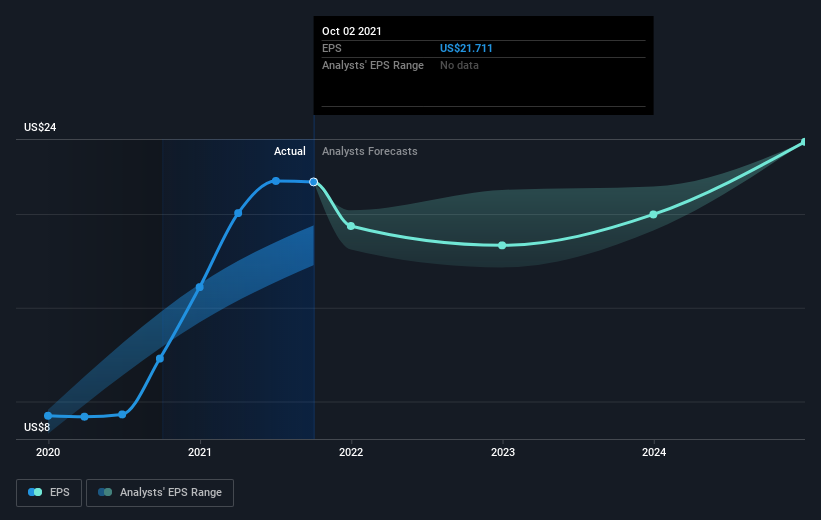Thermo Fisher Scientific's (NYSE:TMO) earnings growth rate lags the 34% CAGR delivered to shareholders
Long term investing can be life changing when you buy and hold the truly great businesses. And we've seen some truly amazing gains over the years. Don't believe it? Then look at the Thermo Fisher Scientific Inc. (NYSE:TMO) share price. It's 327% higher than it was five years ago. This just goes to show the value creation that some businesses can achieve. On the other hand, the stock price has retraced 3.1% in the last week. But note that the broader market is down 3.3% since last week, and this may have impacted Thermo Fisher Scientific's share price.
While the stock has fallen 3.1% this week, it's worth focusing on the longer term and seeing if the stocks historical returns have been driven by the underlying fundamentals.
View our latest analysis for Thermo Fisher Scientific
To paraphrase Benjamin Graham: Over the short term the market is a voting machine, but over the long term it's a weighing machine. One imperfect but simple way to consider how the market perception of a company has shifted is to compare the change in the earnings per share (EPS) with the share price movement.
Over half a decade, Thermo Fisher Scientific managed to grow its earnings per share at 34% a year. This EPS growth is remarkably close to the 34% average annual increase in the share price. Therefore one could conclude that sentiment towards the shares hasn't morphed very much. Rather, the share price has approximately tracked EPS growth.
You can see below how EPS has changed over time (discover the exact values by clicking on the image).
It is of course excellent to see how Thermo Fisher Scientific has grown profits over the years, but the future is more important for shareholders. If you are thinking of buying or selling Thermo Fisher Scientific stock, you should check out this FREE detailed report on its balance sheet.
What About Dividends?
As well as measuring the share price return, investors should also consider the total shareholder return (TSR). The TSR is a return calculation that accounts for the value of cash dividends (assuming that any dividend received was reinvested) and the calculated value of any discounted capital raisings and spin-offs. Arguably, the TSR gives a more comprehensive picture of the return generated by a stock. As it happens, Thermo Fisher Scientific's TSR for the last 5 years was 333%, which exceeds the share price return mentioned earlier. This is largely a result of its dividend payments!
A Different Perspective
It's good to see that Thermo Fisher Scientific has rewarded shareholders with a total shareholder return of 22% in the last twelve months. Of course, that includes the dividend. However, that falls short of the 34% TSR per annum it has made for shareholders, each year, over five years. The pessimistic view would be that be that the stock has its best days behind it, but on the other hand the price might simply be moderating while the business itself continues to execute. If you would like to research Thermo Fisher Scientific in more detail then you might want to take a look at whether insiders have been buying or selling shares in the company.
Of course Thermo Fisher Scientific may not be the best stock to buy. So you may wish to see this free collection of growth stocks.
Please note, the market returns quoted in this article reflect the market weighted average returns of stocks that currently trade on US exchanges.
Have feedback on this article? Concerned about the content? Get in touch with us directly. Alternatively, email editorial-team (at) simplywallst.com.
This article by Simply Wall St is general in nature. We provide commentary based on historical data and analyst forecasts only using an unbiased methodology and our articles are not intended to be financial advice. It does not constitute a recommendation to buy or sell any stock, and does not take account of your objectives, or your financial situation. We aim to bring you long-term focused analysis driven by fundamental data. Note that our analysis may not factor in the latest price-sensitive company announcements or qualitative material. Simply Wall St has no position in any stocks mentioned.

 Yahoo Finance
Yahoo Finance 
